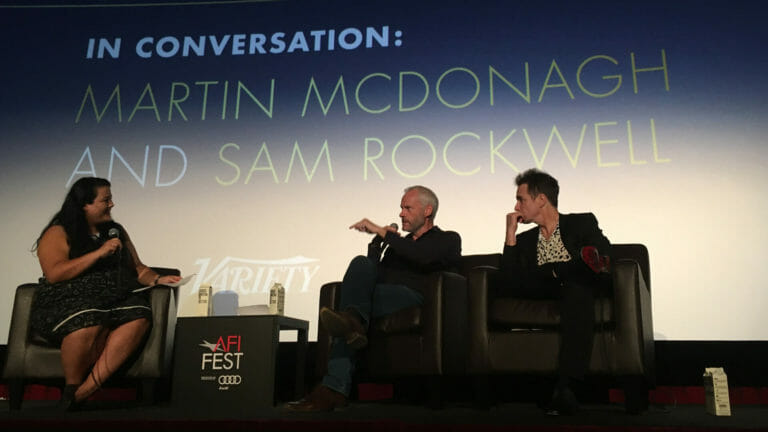By Staff · November 15, 2017

By Tom Dever
Sustaining a cacophonous banter similar to the signature dialogue of his films, screenwriter Martin McDonagh, joined by actor Sam Rockwell, kept the AFI audience laughing for much of his Q & A last night. The writer and actor clearly have a deep affinity for one another and appeared to be having the time of their lives as they fielded questions from Variety’s Jenelle Riley about his recent release Three Billboards Outside of Ebbing, Missouri. In the valleys between laugh curves, both the writer and actor offered excellent advice and perspective on screenwriting.
 MARTIN MCDONAGH
MARTIN MCDONAGH
One of the first questions from Riley was when McDonagh felt he could officially call himself “a writer.” McDonagh gave himself two benchmarks, the first being to write something that he thought was good. Without considering critical or financial success, McDonagh simply wanted to write something he was proud of before anything else. He felt he accomplished this as a teenager with one of his stage plays.
There is always pressure on a writer to create something that sells or something you think other people will like. Before anything, though, you must write something you like. How else can you expect other people to?
McDonagh also faced the reality of being paid for his work. In a story similar to so many successful writers, he faced a ton of rejection along the way. He wrote radio plays and sent them to stations all around the world. He received so many rejections that he could no longer afford the return postage on his rejected material. After over twenty rejections, an Australian station accepted two of his plays and paid him $400. This was the official beginning of his career.
The lesson here is a common one: rejection sucks but it is necessary. While it is easy to feel discouraged when someone turns down your material, you must remain consistent and vigilant until you receive that validation. Don’t worry; it will come.
When asked at what point his career could sustain him enough that he didn’t need a day job, McDonagh surprised the audience by saying he never had a day job. He never wanted to have a “plan b” and, by not having other sources of income, he forced himself to write to the point of viability.
While we are not advising anyone to quit their jobs, it is important to always make your writing a priority. When we give ourselves that contingency in the back of our minds, it makes it that much easier to give up. McDonagh didn’t make In Bruges until he was almost forty. It would have been very easy to settle for something else before then.
So many writers wonder if it is worth it to make a short film. Sure, the budget is easier to manage, but the return on investment is unlikely if not impossible. For McDonagh, though, his career as a film writer/director took off after his short Six Shooter won the Academy Award for Best Live Action Short Film.
He did warn, though, that in a short film setting, it is important to get the best out of your cast and crew. These people are usually doing it for free or as a favor and take that as an excuse to give less than maximum effort. If you decide to make a short, you owe it to yourself to staff a production with invested people who will give it their all.
The actor had some great advice as well…
 SAM ROCKWELL
SAM ROCKWELL
Seems like a simple rule to live by, but Rockwell iterated how his favorite people to work with, and those he has collaborated with have all been “good people.” Regardless of the setting or the project, never underestimate how far simply treating people well will take you.
So many writers cringe at the thought of talking about their work or immediately follow a compliment with a quip of self-deprecation. STOP! To create, collaborate and see a vision through to completion will require you to articulate your vision in a way that others will understand and get excited about.
In a segment where Rockwell discussed how fun it is to say McDonagh’s infamously vulgar dialogue, Rockwell gave a stark observation about the words in screenplays. As writers, we need to understand why every single word is in the script and why an actor would want to say them. While the character may initially exist in your head, their words eventually must exist in an actor’s voice. Give them something fun and interesting to say!
For the latest from The Script Lab, check us out on Twitter, Facebook, and Instagram.